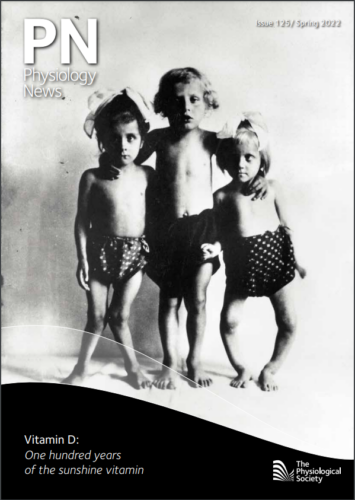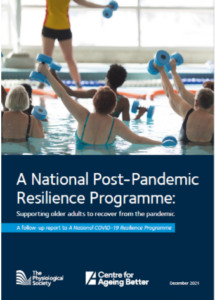
Physiology News Magazine
Policy Focus
How can we develop a National Post-Pandemic Resilience Programme?
News and Views
Policy Focus
How can we develop a National Post-Pandemic Resilience Programme?
News and Views
https://doi.org/10.36866/pn.25.10
Dr Alison Giles, formerly Director of the Centre for Ageing Better
Professor Paul Greenhall, MRC Versus Arthritis Centre for Musculoskeletal Ageing Research and NIHR Nottingham Biomedical Research Centre, University of Nottingham, UK / The Physiological Society
Tom Addison, Policy Manager, The Physiological Society
Throughout the COVID-19 pandemic, older people have been disproportionately affected by the virus. Despite an overall decline in hospital admission rates between 2020 and 2021, hospitalisations in the over-75s continue to far outnumber those in younger age groups (ONS, 2022). The risk of death from COVID-19 has remained closely correlated with age throughout the pandemic (UK Government).
Two years on from the first COVID-19 infections, the national rollout of vaccines has fundamentally changed the nature of the pandemic. Given the reductions in deaths and hospitalisations as a result of vaccines and treatments, we can now start to contemplate a post-pandemic world. As part of that, it will be essential to address the impact of COVID-19 lockdowns and restrictions on the mental and physical health of older people.
The Physiological Society and the Centre for Ageing Better brought together physiologists, nutritionists, geriatricians, physiotherapists and clinicians to discuss critical areas where the impact of the pandemic and lockdown on older people required greater consideration. The resulting report, A National Post- Pandemic Resilience Programme: Supporting older adults to recover from the pandemic was published in December 2021.
Key findings
As the UK emerges from the COVID-19 pandemic, we asked YouGov to survey 2,014 older people to give us an indication of what the long-term impact of lockdowns and restrictions may be on their health. The results clearly showed that the pandemic has had a detrimental impact on physical activity levels: despite restrictions now being lifted, over a quarter of over-50s told us they are less physically active than pre-pandemic. Given the role of physical activity in maintaining health, this is a cause for real concern and it is likely that general health will have diminished as a direct consequence. This was particularly acute in the over-75s (34% of respondents) – an age group in which a loss of function is more likely to lead to a noticeable reduction in quality of life (the difference, perhaps, between being able to leave the house independently, drive a car etc.).
There was noticeable variation in the reasons behind the lack of physical activity by gender. Women were more likely to report a lack of motivation compared to men (47% compared to 39% of men), while men were more likely to report a loss of habit of exercise or socialising in person (43% compared to 41% of women).
Despite a reduction in physical activity compared to pre-lockdown in all age groups surveyed, the means by which different age ranges felt they would be motivated or encouraged to do more physical activity differed. Those aged 50–59 preferred activity monitors and tracking apps, 60–74-year- olds preferred social activity groups and those aged 75+ preferred tailored advice from a healthcare professional. This should come as no surprise given that most 50–59-year- olds will be in some form of formal work and will be faced with the same changing working practices (increased homeworking, reduction in face-to-face contact with customers and business networks) as the rest of the workforce. As our respondents moved towards and into retirement, the need for more social (and then tailored) forms of physical activity increased.
Key recommendations
We are calling for public health agencies across the UK to launch a National Post- Pandemic Resilience Programme: a joined-up system of support to provide older people with tailored advice and guidance on how to improve health post pandemic. The aim should be to not only return older people to their pre-pandemic physical activity levels but encourage greater long-term levels of activity.
A National Post-Pandemic Resilience Programme should include:
A programme of physical activity to increase physical resilience in older people, particularly those with conditions that put them at higher risk of complications from a COVID infection such as obesity, type 2 diabetes, cardiovascular disease and sarcopenia.
This programme of physical activity would be facilitated through a network of local groups to provide guidance and support. The programme will need to be designed in conjunction with exercise scientists and older people themselves. Such a programme will improve both physical and mental health.
A specific focus on increasing physical activity of people in their 50s to prevent future frailty.
Older people should be engaged long before they are considering retirement to support them to take steps earlier to live longer, healthier, happier lives. The 50–59 group should be provided with activity trackers and online information to give them the ability to take control of their own health, as well as partnering with employers to promote workplace health.
“At home” physical activity options.
Twenty-three percent of older people surveyed expressed concern about catching COVID-19 as a reason they had reduced their physical activity levels. “At home” physical activity options would help those who are not yet ready to go back to busier places to increase their activity levels in a way they feel comfortable with, and would therefore be more likely to undertake regularly.
Clear guidance about the importance of a healthy balanced diet.
This advice should be linked explicitly to maintaining health and the body’s resilience in later life, so that older people understand the direct link between lifestyle choices and health and resilience.
Steps to embed behaviour change.
None of this programme’s proposed activities will work unless we can successfully re-build older adults’ confidence and support them to stay active and keep well. Therefore, we will need to be able to enlist the help of relatives, care workers and other professionals to reinforce messages around resilience in their day-to-day interactions with older people in their families or for whom they care.
Launch event
The report was launched at an online event chaired by Dr Alison Giles and with participation from Professor Paul Greenhaff, Sue Dewhirst from NHS England, Alison Ilif from the Office for Health Improvement and Disparities (OHID) and Beth Mitchell from GreaterSport in Manchester. All the panellists provided a short overview of how their organisations are responding to the need to keep older people active in the aftermath of the pandemic. Questions from the audience focused on how to increase physical activity in different settings (such as care homes) and the physiological trial data that underpin the need to maintain function in later life. Audience members were also encouraged to share the report’s findings with their organisation and reach out to the organisations represented on the panel for more information about their work in this area.

